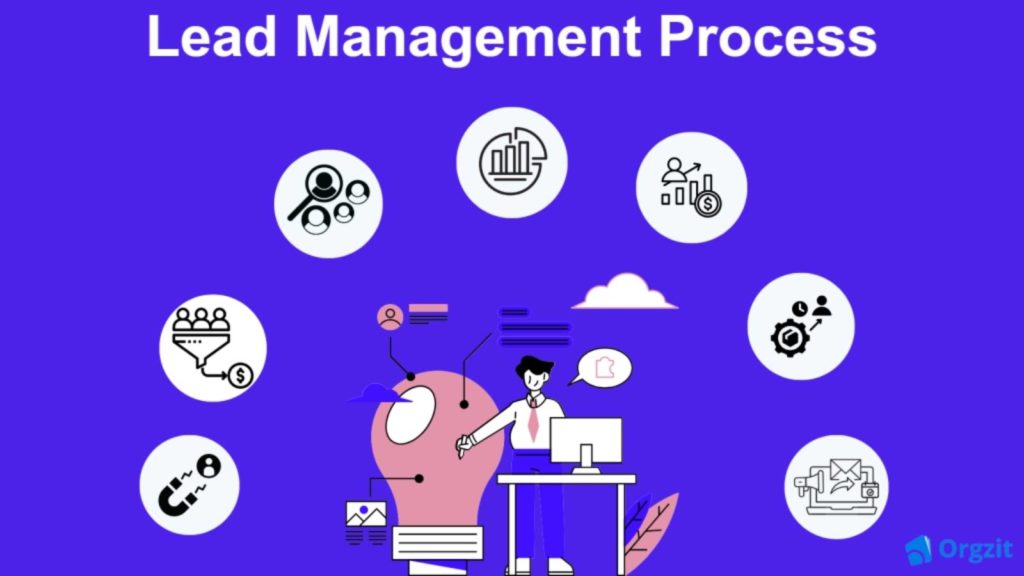From smartphones to smart homes, we rely on technology for communication, entertainment, and even basic tasks like grocery shopping. With the advancement of artificial intelligence, machines are becoming increasingly intelligent and capable of performing complex tasks.
This has sparked a debate about the potential risks and benefits of relying so heavily on technology. While some argue that technology is making us lazy and disconnected, others believe that it is enhancing our lives in numerous ways. Ultimately, the impact of technology on society will depend on how we choose to embrace and use it.
Also Read: The importance of staying updated on sales tips for success in 2024
Effective sales lead management is crucial in today’s technologically advanced society. With the increasing reliance on technology, small businesses must be able to effectively manage and utilize the leads generated through various channels.
This includes implementing automated systems and tools to track and prioritize leads, as well as utilizing data analytics to gain insights and make informed decisions. By effectively managing sales leads, businesses can maximize their sales potential and stay competitive in an increasingly digital marketplace.
Sales lead management software offers numerous benefits for businesses. Firstly, it provides a centralized and organized system for tracking and managing leads, ensuring that no potential customer falls through the cracks.
This enables businesses to follow up with leads promptly and efficiently, increasing the likelihood of conversion. Additionally, sales lead management software can automate repetitive tasks, freeing up valuable time for sales teams to focus on building relationships and closing deals.
Moreover, the software’s data analytics capabilities allow businesses to identify patterns and trends in lead generation, enabling them to fine-tune their marketing strategies and target the most promising leads. Overall, implementing sales lead management software streamlines the sales process, improves efficiency, and ultimately leads to higher sales and revenue.
Features of Sales Lead Management Software
Some key features of sales lead management software include lead tracking and scoring, which allows businesses to keep track of the progress of each lead and assign a score based on their likelihood of converting. This helps sales teams prioritize their efforts and focus on the most valuable leads.
Lead tracking and monitoring capabilities
The software also often includes lead nurturing capabilities, which automate personalized communication with leads to keep them engaged and move them further down the sales funnel.
Also Read: Product management vs Project management: 5 Crucial Distinctions
Additionally, sales lead management software often integrates with other CRM systems, providing a seamless flow of information and ensuring all customer data is centralized and easily accessible.
Lead qualification and scoring tools
Lead qualification and scoring tools are essential features of sales lead management software. These tools allow sales teams to determine if a lead meets certain criteria and assign a numerical value to each lead based on their potential to convert. This helps sales teams identify the most qualified leads and prioritize their follow-up activities accordingly.
By automating the lead qualification and scoring process, sales lead management software streamlines the sales process and improves overall efficiency. This ultimately leads to higher conversion rates and increased revenue for businesses.
For example, a sales lead management software may include lead qualification and scoring tools that track the actions and behaviors of leads, such as website visits, email opens, and form submissions. Based on this data, the software assigns a score to each lead indicating their likelihood of converting.
This allows sales teams to focus their efforts on leads with higher scores, increasing their chances of closing deals. Additionally, the software can automate personalized communication with leads based on their score, sending targeted emails or scheduling follow-up calls to nurture the leads and move them further down the sales funnel.
Also Read: Why Team Management Balance is Important in 2023
However, a detailed counterexample to the progress of each lead and assigning scores based on their likelihood of converting could be a situation where the sales lead management software fails to accurately assess the potential value of leads.
This could happen if the software relies solely on quantitative data and does not take into account qualitative factors such as individual preferences or specific market conditions. As a result, high-value leads may be overlooked while low-value leads are given undue attention, leading to missed opportunities and ineffective prioritization of efforts.
Integration with CRM systems
Integration with CRM systems for seamless data management and real-time updates is crucial to ensure accurate assessment of lead potential. By capturing and analyzing both quantitative and qualitative data, the software can provide a more comprehensive and holistic view of each lead’s potential value.
This integration allows for a more streamlined and efficient lead management process, reducing the likelihood of missed opportunities and maximizing the effectiveness of sales efforts.
With seamless data management, sales teams can prioritize their efforts based on a thorough understanding of each lead’s likelihood of converting, ultimately leading to improved conversion rates and overall sales success.
One example of this could be a sales lead management software that integrates with a customer relationship management (CRM) system. This integration allows for seamless data sharing between the two systems, ensuring that all relevant information about leads is captured and analyzed.
For instance, if a lead has a history of engaging with certain marketing campaigns or has shown interest in specific products, this qualitative data can be integrated with quantitative data to accurately assess the potential value of the lead.
Benefits of Sales Lead Management Software
Benefits of Sales Lead Management Software include increased efficiency and productivity, improved lead quality and conversion rates, and better alignment between sales and marketing teams. By automating lead management processes, sales teams can save time and focus on nurturing high-quality leads, resulting in higher conversion rates.
Additionally, the integration of qualitative and quantitative data provides a more holistic view of leads, allowing sales teams to tailor their approach and increase the chances of closing deals.
Finally, the alignment between sales and marketing teams ensures that leads are properly qualified and handed off, reducing friction and improving overall efficiency.
Improved lead conversion rates
Improved lead conversion rates – Increased efficiency in lead management, as the software automates processes such as lead tracking, follow-ups, and lead assignment, reducing manual work and saving time for sales teams.
Enhanced lead nurturing capabilities, as the software allows for personalized and targeted communication with leads based on their specific interests and engagement history, increasing the likelihood of conversion.
Better visibility and tracking of lead performance, as the software provides real-time analytics and reporting on key metrics such as lead sources, conversion rates, and sales pipeline, enabling sales teams to make data-driven decisions and optimize their strategies.
Improved collaboration and alignment between sales and marketing teams, as the software facilitates seamless communication and information sharing, ensuring that both teams are on the same page and working towards the same goals.
Streamlined lead nurturing and follow-up process
Streamlined lead nurturing and follow-up process , as the software automates and simplifies tasks such as email marketing, lead scoring, and scheduling follow-up activities. This ensures that leads are consistently engaged and nurtured throughout the sales process, increasing the chances of conversion.
Additionally, the software enables personalized and targeted communication with leads, allowing sales teams to deliver relevant and timely information that resonates with potential customers. Overall, the implementation of this software can greatly enhance a company’s lead management efforts and ultimately drive higher conversion rates.
Enhanced sales team collaboration and productivity
Enhanced sales team collaboration and productivity is another benefit of implementing lead management software. With a centralized platform, sales teams can easily access and share lead information, track progress, and collaborate on strategies.
This streamlines communication and eliminates the need for manual data entry, saving time and reducing errors. As a result, sales teams can work more efficiently and effectively, focusing on closing deals and driving revenue. Ultimately, this increased collaboration and productivity contribute to the overall success of the company’s sales efforts.
Factors to Consider when Choosing Sales Lead Management Software
When choosing sales lead management software, several factors need to be carefully considered. Firstly, it is crucial to assess the specific needs and goals of the business. This includes evaluating the desired functionality of the software, such as lead tracking, lead nurturing, and reporting capabilities.
Additionally, it is important to consider the scalability and flexibility of the software to ensure it can accommodate the company’s future growth.
Another factor to consider is the integration capabilities of the software with other existing tools and systems within the organization.
Lastly, the cost and return on investment should also be taken into account to ensure that the chosen software aligns with the company’s budget and delivers the expected benefits.
Scalability and customization options
Scalability and customization options are important factors to consider when choosing sales lead management software. Scalability is important because as your business grows, you will need a software that can handle an increasing number of leads and users. Customization options are also crucial as they allow you to tailor the software to fit your specific sales processes and workflows.
By carefully evaluating the scalability and customization options of different sales lead management software, you can ensure that you choose a solution that will effectively support your growing business needs.are important factors to consider when choosing sales lead management software.
Integration capabilities with existing sales and marketing tools
Integration capabilities with existing sales and marketing tools are important factors to consider when choosing sales lead management software. This ensures that the software can seamlessly integrate with your current systems, allowing for a smoother transition and streamlined processes.
Additionally, integration capabilities enable data sharing and synchronization, allowing for a more comprehensive and holistic view of your leads and customers. By selecting a software with strong integration capabilities, you can maximize the efficiency and effectiveness of your sales and marketing efforts.
User-friendliness and ease of implementation
User-friendliness and ease of implementation are also crucial aspects to take into account. A user-friendly interface and intuitive navigation make it easier for your sales team to adopt and utilize the software effectively.
The software should also have a straightforward implementation process, minimizing downtime and ensuring a quick and seamless transition. This way, your team can start benefiting from the software’s features and functionalities without any unnecessary hurdles or delays.
Conclusion
A CRM is most likely what you want if you’re searching for a single lead management solution. However, since lead management is a complicated process, it is possible that your online lead management system will include a whole toolkit. Lead generation is the first step, followed by lead distribution, lead scoring, lead nurturing, and so on.
I won’t try to compile a list of certain applications and refer to them as the greatest lead management software since a lot of people do that and they haven’t had a chance to evaluate every lead management tool in every lead management category.
Rather to that, let me present you to the kind of apps you should consider while building your leads management system. Along the way, I’ll recommend several apps and provide links to lists of the top apps in each category so you may do further research.
In order to have a successful lead management strategy, you must first have some leads available. Your lead generating routines can help with that. Lead generation isn’t just one thing to cross off your to-do list, much like lead management. It consists of several complementing elements that work together to draw customers to your establishment and attract new ones.
See Zapier’s coverage of the top lead generating software for a comprehensive rundown of available solutions. Apps like Carrd, which allows you create a one-page website in minutes and gives its basic features for free, are among them. Another tool is RisePath’s CRM software for small business.
Whether you want to use email marketing, lead generating forms, landing sites, top-of-funnel content, or anything in between, the correct lead management solutions can help you develop your lead generation funnel.
Make sure to evaluate your lead generation efforts after you’ve set up your tools. One way to better understand where your efforts are being wasted and where they are making a difference is to analyze your lead score numbers. In this manner, you may proceed to the actual lead management phase of the process.




Comments are closed, but trackbacks and pingbacks are open.